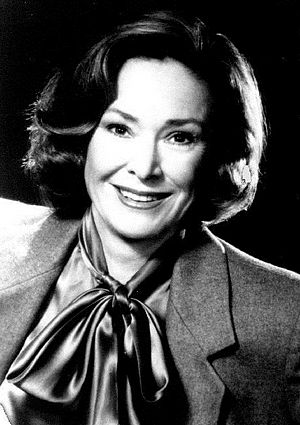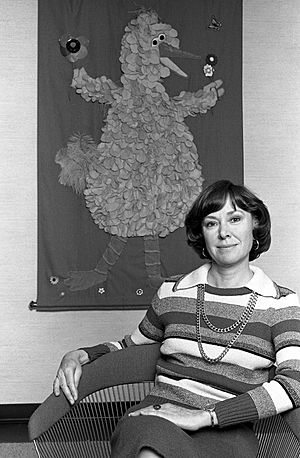Joan Ganz Cooney facts for kids
Quick facts for kids
Joan Ganz Cooney
|
|
|---|---|

Cooney in 1985
|
|
| Born |
Joan Ganz
November 30, 1929 Phoenix, Arizona, U.S.
|
| Education |
|
| Occupation | |
| Known for | Children's Television Workshop (1968-2000) (renamed) Sesame Workshop (2000–present) Sesame Street (1969–present) |
| Spouse(s) |
|
| Relatives | Emil Ganz (grandfather) |
Joan Ganz Cooney (born Joan Ganz; November 30, 1929) is an American television writer and producer. She is famous for helping to create Sesame Workshop. This organization is known for the children's TV show Sesame Street. Joan Cooney also co-created Sesame Street itself.
She grew up in Phoenix, Arizona. In 1951, she earned a degree in education from the University of Arizona. After college, she worked for the United States Department of State in Washington, D.C. She also worked as a journalist in Phoenix. Later, she became a publicist for TV companies in New York City. In 1961, she became interested in educational television. She started producing documentaries for New York's first educational TV station, WNET (Channel 13). Many of her programs won local Emmy Awards.
In 1966, Joan Cooney had a dinner party at her home. There, she discussed with Lloyd Morrisett how television could teach young children. Cooney was chosen to lead the creation of what became Sesame Street. The show first aired in 1969. She also led the Children's Television Workshop (CTW), which produced the show. Cooney was the CTW's first executive director. She was one of the first women to hold such a high position in American television. Her appointment was called "one of the most important television developments of the decade."
Cooney was the executive director of CTW until 1990. After that, she became the chair of CTW's board. She served on many other boards and received many awards. In 2007, Sesame Workshop started The Joan Ganz Cooney Center.
Contents
Early Life and Education
Joan Ganz was born on November 30, 1929, in Phoenix, Arizona. Her father, Sylvan Ganz, was a banker. Her mother, Pauline, was a homemaker. Her grandfather, Emil Ganz, was a successful businessman. He was even mayor of Phoenix three times. Joan was the youngest of three children. She described her childhood as "upper middle class." She said she was raised to be a housewife and mother.
She went to North High School in Phoenix. There, she enjoyed being in school plays. She said her teacher, Bud Brown, greatly influenced her. His talks about important social issues "absolutely inflamed" her and changed her life. After high school, she attended Dominican University of California for a year. Then, in 1948, she transferred to the University of Arizona. She stopped acting in college because her father did not support it as a career. She chose to study education. She later said it was "something that girls of my generation did."
Starting Her Career in Media
After graduating in 1951, Joan Ganz moved to Washington, D.C.. She worked as a clerk and typist for the United States Department of State. She was inspired by Father James Keller's Christopher Movement. This movement encouraged people to get involved with media. Cooney later said, "Father Keller said that if idealists didn't go into the media, nonidealists would."
She returned to Phoenix and became a reporter for the Arizona Republic newspaper. She had no previous experience in journalism. In 1953, at age 23, she moved to New York City. For the next ten years, she worked in public relations. She worked for RCA, then NBC, and later CBS. During this time, she became involved in politics. She met many writers and editors.
While working for U.S. Steel Hour, a colleague left to work for an educational TV station. Cooney was surprised and excited. She later said, "I knew that I was born to be in educational television." In 1961, she followed a court case about a non-profit group trying to get a TV station. This station would become WNET, New York's first public television station. When channel 13 became non-commercial in 1963, Cooney applied to be a publicist. But the general manager told her they needed producers. She said, "I can produce," even though she had no experience. She later said, "I've never been qualified for any job I've been hired for."
Cooney took a pay cut to become a producer. She and her boss, Lewis Freedman, created shows about important issues. One of her first programs was Court of Reason, a weekly live debate show. Guests included important figures like Malcolm X. She also produced a debate show about America's policy on Cuba. Another show, Poverty, Anti-Poverty, and the World, brought people experiencing poverty into the studio to talk with government officials. These shows won Emmy Awards. She also produced documentaries that were well-received. One, A Chance at the Beginning, featured a program similar to Head Start. It won her a local Emmy.
In February 1964, at age 34, she married Timothy Cooney. He worked for the New York City mayor. He was also involved in civil rights. Joan Cooney said he helped her become a feminist. He was very supportive of her career.
Creating Sesame Street
In the winter of 1966, Joan Cooney had a small dinner party. Her husband, her boss Lewis Freedman, and Lloyd Morrisett were there. Morrisett worked for the Carnegie Corporation, which funded educational research. The conversation turned to how television could teach young children. Morrisett asked, "Do you think television could be used to teach young children?" Cooney replied, "I don't know, but I'd like to talk about it." This party started a long working relationship between Cooney and Morrisett.
A week later, Cooney and Freedman met with Morrisett to discuss studying how to create an educational TV show for preschoolers. Cooney was chosen to do the study. In the summer of 1967, Cooney took time off from WNDT. With funding from the Carnegie Corporation, she traveled across the U.S. and Canada. She interviewed experts in child development, education, and television.
She wrote a 55-page report called "The Potential Uses of Television in Preschool Education." This report described what the new show would look like. It also suggested creating a company to produce it. This company became the Children's Television Workshop (CTW). Cooney said her education background helped her write the study. Her Emmy Award also gave her credibility with experts and funders. She wanted to "make a difference" with television. She later said, "Preschoolers were not necessarily my thing. It was using television in a constructive way that turned me on."
At first, Cooney thought WNDT would produce the project. But the station's owner rejected the idea. So, Cooney left the station in May 1967. She became a full-time consultant for the Carnegie Corporation. For the next two years, Cooney and Morrisett worked on the new show. They raised $8 million for Sesame Street and started the CTW.
Some people doubted Cooney could be the executive director of CTW. They worried about her lack of high-level management experience. There were also questions about whether a woman could lead such a big project. But with support from her husband and Morrisett, Cooney pursued the role. The project's investors realized they needed her. In February 1968, Cooney was named executive director of CTW. Her appointment was seen as "one of the most important television developments of the decade."
Sesame Street first aired on PBS on November 10, 1969. In its first season, the show won three Emmys and a Peabody Award. It was even featured on the cover of Time magazine. The show was very popular. Cooney said, "The reception was so incredible. The press adored us; the parents adored us." She received many requests for interviews. She also spoke at Congressional hearings about children and television.
In 1969, the Cooneys became foster parents to a child from the city. The child later returned to live with his mother. Joan and Timothy Cooney's marriage ended in 1975. In 1980, Cooney married businessman Peter G. Peterson. He was a former U.S. Secretary of Commerce. They met when he was on the board of National Educational Television. They were married for 37 years until his passing in 2018. Through her marriage to Peterson, she gained five stepchildren and nine grandchildren.
Later Years and Legacy
Joan Cooney remained the chairwoman and chief executive officer of the CTW until 1990. She then became chairman of the CTW's executive board. In this role, she oversaw the organization's business and creative side.
Cooney served on several important committees and corporate boards. These included the Mayo Foundation, Chase Manhattan Bank, and Johnson & Johnson. She knew she was invited to these boards because she was a woman. Companies wanted to be more inclusive. She also gave public speeches for the CTW and worked on documentaries. She said her board work taught her how to run an organization.
In 2007, Sesame Workshop started The Joan Ganz Cooney Center. This independent, non-profit organization studies how to improve children's learning. It focuses on using and developing digital technologies. The goal is to help children's literacy, just like Sesame Street did. In 2014, a pre-kindergarten program for young children in New York City was named the Joan Ganz Cooney Early Learning Program.
Awards and Honors
Joan Ganz Cooney has received many awards for her work.
- Christopher Medal, 1970
- Frederick Douglass Award, 1972
- Emmy Award, for Lifetime Achievement, 1989
- Academy of Television Arts and Sciences Hall of Fame, 1989
- Presidential Medal of Freedom, 1995
- National Women's Hall of Fame, 1998
- National Humanities Medal, 2004
- Literarian Award of the National Book Award, 2010
- International Honor for Excellence; first woman to receive this award, 2018
Honorary Degrees
She has also received honorary degrees from many universities, including:
- Boston College, 1970
- Princeton University, 1973
- Harvard University, 1975
- University of Notre Dame, 1982
- Columbia University, 1991
- New York University, 1991
- Dartmouth College, 2006
- Northwestern University, 2012
 | Aurelia Browder |
 | Nannie Helen Burroughs |
 | Michelle Alexander |


